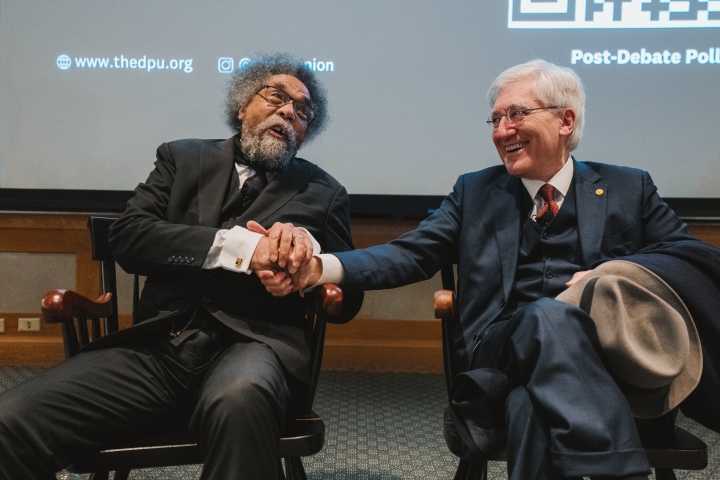Should governments plan and control economies with the aim of benefiting all citizens, or are market systems better at distributing wealth in ways that promote social mobility?
That question fueled a spirited conversation Jan. 16 between two longtime friends whose views place them at opposite ends of the ideological spectrum.
The debaters were Robert George, a leading conservative and the McCormick Professor of Jurisprudence and director of the James Madison Program at Princeton University, and Cornel West, a professor emeritus at Princeton and the Dietrich Bonhoeffer Professor of Philosophy and Christian Practice at Union Theological Seminary. West, who ran for president last year as an independent, eschews political labels but holds many views consistent with democratic socialism.
The two debated in Filene Auditorium before a capacity crowd of 250, along with other viewers via livestream video.
Sponsored by the Dartmouth Political Union and Dartmouth Dialogues, the conversation was moderated by DPU President Mac Mahoney ’26, who began by asking George to reconcile his support for free markets as drivers of upward mobility with the fact that “rates of absolute mobility have fallen from approximately 90% of children born in the 1940’s to 50% of children born in the 1980’s.”
“Historically and across cultures, the introduction of a market system has often lifted large numbers of people out of poverty,” George replied. But, he added, markets must be properly regulated, and there must be safety nets for those who fall through the cracks.
“So often you have the superficial appearance of a free market, but you have, in reality, oligopolies or even monopolies,” he said. “And very often businesses that purport to be operating in a free market are riding on government, government subsidies, government controls. That’s just a pseudo market. I think if we want genuine social mobility, we need a real free market in which you can have real competition.”
West agreed that the United States has drifted far from the classic free enterprise system envisioned centuries ago by the so-called “Father of Capitalism.”
“Adam Smith is turning over in his grave when he looks at contemporary predatory capitalist processes in the United States,” West said. “His conception of the market had little to do with huge monopolies that have a disproportionate amount of the market, where huge advertising companies shape the consumer sensibility of the various people you’re selling to. That’s just greed, just raw greed. It has to be accountable.”

While conceding that “command” Soviet-era economies failed to better the lives of ordinary people, West said he has rarely seen constructive responses from U.S. capitalists to “concrete catastrophes” like poverty, injustice, and cruelty. When he was born, West said, “80% of Black folk were living in poverty.” And today, he said, “in the richest nation in the world,” two out of five Black children are still living in poverty.
“How do I somehow make space for the love, for the justice, for the kindness, for the sweetness in a world that is so cold and cruel?” he asked. “That’s my starting point just as a Christian, right? And so then the question becomes, in my own shaping and molding in terms of the West family, in terms of Shiloh Baptist Church and the Black Panther party where I worked, in terms of Martin Luther King Jr.’s legacy, and Fannie Lou Hamer and others, how those who were concerned about the catastrophes tended to be people who talked about it as a socialism issue. It wasn’t a whole lot of capitalists running around, especially from the well-to-do classes, concerned about poor people. I didn’t see them.”
Sharing West’s concern about the decline of moral values in American culture, George acknowledged that while widespread benefits accrue under market systems, so, inevitably, do costs. For example, when England’s prime minister, Margaret Thatcher, decided to import cheap coal from Poland, thousands of Welsh miners were abruptly thrown out of work. But overall, he said, Thatcher’s conservatism paid off for the majority of her constituents.
“I think the principle of the equality of all human persons in dignity, the basic dignity of all human beings, that all human beings are bearers of profound, inherent, and equal dignity—that’s something that’s intrinsically valuable,” George said. And although he worried that “conservatism is moving in the direction of the abandonment of that principle,” he said he sees no “intrinsic value in everybody having roughly the same amount of wealth.”
West and George, who forged their close friendship many years ago when both taught at Princeton, have co-authored a new book, Truth Matters: A Dialogue on Fruitful Disagreement in an Age of Division, to be released later this month. During the Q&A session they were asked how people who disagree sharply on major issues can show lasting mutual respect for each other.
“Let me ask you this,” George answered. “Are we fallible only on the minor trivial, superficial issues in life? Or are we also fallible on the big important profound questions? Questions of meaning and value? Questions of human nature, human good, human rights, human dignity? Human destiny? I think we all agree we’re fallible even on the big questions. Now that means we have a very good incentive to listen to our critics.”

West, a 2018 Montgomery Fellow at Dartmouth, agreed, and offered up a hypothetical example of allowing empathy to triumph over enmity.
“If (President-elect Donald) Trump walked through the door right now and he said, Brother West, you’ve been calling me a gangster for eight years, I’d say, yeah, that’s right. You got the right brother. But I’d ask him, how’s your son doing? Because I don’t want your son treated the way you often treat some of these immigrants on the border. Your son has a dignity and a sanctity I’ll never lose sight of, because he’s made in the image of a loving mighty God.”
After the debate, Eli Moyse ’27, DPU’s debate director, found George’s approach to capitalism “refreshing,” but, speaking for himself and not the DPU as a whole, said he found West’s faith-based critique ultimately more convincing.
“George makes a compelling argument that a market-based system with some controls can be a great way to lift people out of poverty and increase social mobility. But I also think that he sanitizes in his argument a lot of the realities of an unfettered capitalist system that perpetuates oppression,” Moyse said.
Last night’s debate was the second in DPU’s yearlong series of matchups between experts representing a variety of perspectives on controversial issues.


